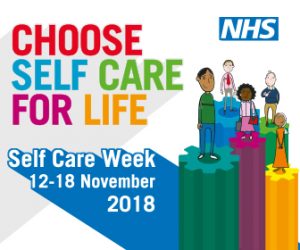An amazing 300 plus organisations got involved in Self Care Week last year with a reach of more than 22 million people, more than a third of England’s population. Dr Ian Banks, Trustee for the Self Care Forum and President of the European Men’s Health Forum, wants your help to make it bigger and better than ever before…

The Self Care Forum launched in 2009 with the aim to support people to take better care of their own health.
This awareness week, organised by the Forum since 2011, is now a well-established initiative used by many local health organisations including Healthwatch, CCGs, surgeries, pharmacies, local authorities and ambulance trusts.
It is encouraging that the benefits of promoting self care are being realised by more than the traditional health organisations. Self Care Week appeals to an increasingly eclectic mix, reaching out to schools, universities, gyms, national parks, bloggers, libraries, charities, local businesses and more.
That such growing and diverse communities are participating and communicating their own brand of self care, proves that our awareness week is having significant impact. As organisers, we are both gratified and inspired by the enthusiasm and innovation being demonstrated at a local level.
 Last year’s award winners and innovators were exemplary:
Last year’s award winners and innovators were exemplary:
- Union of Kingston Students won overall with their excellent work to help students settle into student-life, offering support to promote healthy lifestyles including a safe-space to talk openly about their mental wellbeing.
- Indeed, improving the health literacy of school children and young people earnt several participants special Self Care Week innovation awards. For instance, Compass House Medical Centre in Brixham, whose patients and local community were largely disengaged and disempowered in their health, worked hard to re-engage the local population and went into schools to deliver health awareness classes.
- South Cheshire CCG and Royal Vale CCG collaborated closely with local partners to deliver a series of events and “pop up” stands using local links to cascade and target self care messages throughout the community. A dedicated programme of work with local school children was innovative and particularly worthy of an accolade.
- Milton Keynes CCG and its network engaged people as partners in their own health to help reduce demand on local health services. They produced a game to improve people’s ability to self-treat common conditions which had surprising appeal amongst children. Working collaboratively with local agencies also meant that self care messages were consistent and far-reaching.
If you want to join something bigger, start planning for Self Care Week now and help people choose Self Care for Life. For more information, including resources go to the website or contact selfcare@selfcareforum.org. Subscribe to the Self Care Forum’s newsletter.
2 comments
Comment by Gillian Dalley posted on
Self-care is a obviously a good idea but it would ring more true if the attempt to spread its precepts were not taking place just at the time when the NHS is being starved of funds and the scale of its provision is shrinking and increasingly under threat. It sounds all too convenient to me. Get people to look after themselves because the NHS won't be able to help. Moreover it may deter people who really need professional diagnosis, treatment and care from seeking it by making them feel guilty and/or too scared to approach the services. For the last few years, politicians have been starving the NHS of funds. Over-use by ordinary people is not to blame for the sorry state of the NHS - it's the policies of government.
Comment by a blake posted on
Not much use to people needing adult social care when they are not even funded to make and meet routine appointments such as GP, Well men/Women clinics, hospital appointments, dental appointments as doesn't fit in with budget centered approaches to care even though they fill the Care Act eligibility criteria and want to maintain their physical and mental wellbeing but are NOT supported to do so